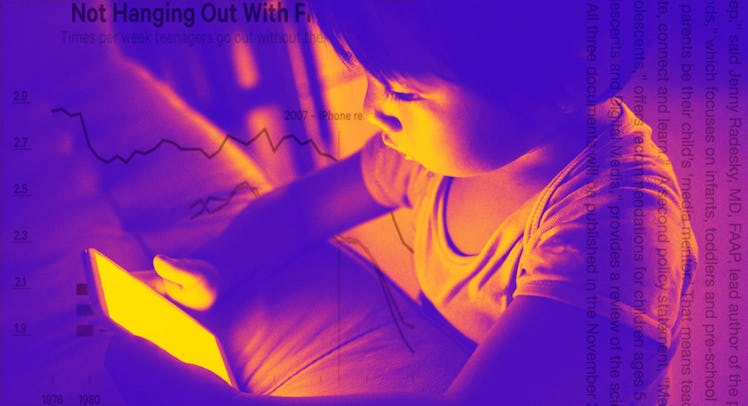New Data Points To Benefits Of Moderate Screen Time For Kids
Study suggests AAP screen time recommendations are based on outdated information, and that kids may actually benefit from more time with digital devices.

Most parents have heard that screen time is the devil. Smartphones and laptops have been blamed for speech delays, sensory overload, lack of sleep, and every conceivable bad behavior. But before you snatch that iPad away from your toddler, consider a new study in Child Development that suggests screen time isn’t all that bad. In fact, researchers surveyed nearly 20,000 families and found that the American Academy of Pediatrics’ current screen-time guidelines are based on old data, culled from families before digital devices became de rigueur.
“Our findings suggest that there is little or no support for the theory that digital screen use, on its own, is bad for young children’s psychological well being,” co-author on the study Andrew Przybylski of the Oxford Internet Institute said in a statement. “If anything, our findings suggest the broader family context, how parents set rules about digital screen time, and if they’re actively engaged in exploring the digital world together, are more important than the raw screen time.”
For dads feverishly following the screen time crackdown, these findings may come as a surprise. Scientists have been calling on a smartphone ban for some time now. Psychologist Jean Twenge’s latest book, iGen: Why Today’s Super-Connected Kids Are Growing Up Less Rebellious, More Tolerant, Less Happy—and Completely Unprepared for Adulthood blames most of the issues in her book’s title on digital media overuse. Meanwhile, AAP guidelines suggest that children engage in absolutely no more than one hour of screen time per day, and call on parents to keep infants entirely unplugged (unless they’re video chatting with loved ones).
And yet, 20,000 phone interviews later, Pryzbylski and his team did not find a correlation between AAP technology use guidelines and children’s well beings. They say this result is likely due to the fact that AAP devises its guidelines based on old data. “Given that we cannot put the digital genie back in the bottle, it is incumbent on researchers to conduct rigorous, up-to-date research that identifies mechanisms by and the extent to which screen-time exposure might affect children,” co-author Netta Weinstein of Cardiff University said in the statement.
Does this mean that it’s open season for smartphones? Not quite. The study relies heavily on self-reporting and the results are therefore not definitive. But even if the results are replicated and scientists can demonstrate prospectively that screen time isn’t so bad, there remain very real threats to children who spend excessive amounts of time online — the internet is crawling with predators; children glued to their laptops get less sleep, leading to a host of physical and mental health problems; internet addiction is real, measurable, and can ruin lives.
The authors, however, stress that we need to take another pass at the data before we set hard-and-fast time limits for internet use. “To be robust,” Przybylski says. “Current recommendations may need to be re-evaluated and given additional consideration before we can confidently recommend that these digital screen-time limits are good for young children’s mental health.”
This article was originally published on